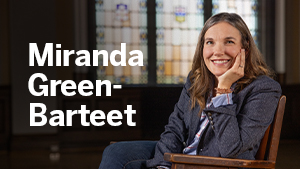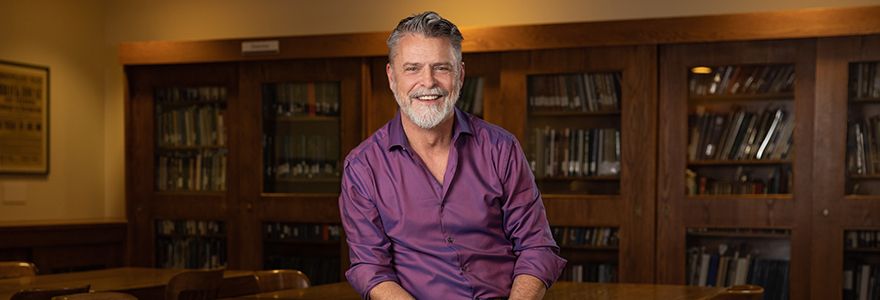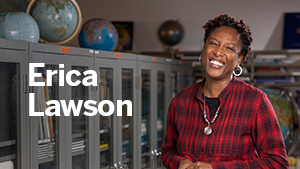Joel Faflak
The meaning of joy in two different worlds
Joel Faflak’s life experiences, and love of literature, have made him believe in combining experiential learning with scholarly rigour
By Nicole Laidler
For Joel Faflak, studying literature is an intensely political act, a way to challenge our understanding of the world and our place in it.
“Literature takes us out of our rational, empirical world and puts us in a completely alternate imagined world, wherein we have to think outside the box of what we understand reality to be,” said Faflak, a professor in the department of English and writing studies at Western.
By transporting the reader to another time and place, and into the mind and body of somebody else, literature can build understanding, empathy and tolerance, said Faflak, who studies British Romantic literature and culture of the late 18th and early 19th centuries as well as American film musicals.
Faflak’s research interests may seem worlds apart, but both explore the meaning of happiness. Psychiatry emerged in the late 18th century to cure ‘madness’ and create the greatest happiness for the greatest number, he notes, while the American musical presented a utopian vision that stood in stark contrast to the harsh realities of the Great Depression.
Today, Faflak argues that happiness has become an ideology. “Critical theorist Slavoj Žižek calls happiness our supreme duty,” he said.
Faflak believes that the relentless pursuit of happiness does a disservice to students entering an uncertain world. Instead, he encourages the pursuit of something closer to joy. “Joy comes from digging deeper, working harder, and it sometimes comes with suffering,” he said. “But when you survive, the sense of self-fulfillment is that much greater.”
Faflak understands the challenges and rewards of pushing beyond expectations.
Born into a working-class family in Chatham, Ontario, Faflak began his academic career after developing a love of literature in high school.
A third-year class in Romantic literature would change his life. “Professor Ross Woodman opened the world for me, and it has never shut.” Woodman went on to supervise Faflak’s MA thesis and co-supervise his PhD thesis. The two men later worked as co-authors and formed a lasting friendship.
But Faflak’s professional life almost took a very different path. Feeling disillusioned towards the end of his MA thesis, he left school and became co-founder of the independent grocery chain Sunripe Freshmarket.
“It was very successful, but I was profoundly unhappy in business,” said Faflak. After seven years, he returned to Western, completed his PhD, and has never looked back.
Today, Faflak teaches both undergraduate and graduate courses in Western’s Faculty of Arts & Humanities, and is a visiting professor at Victoria University at the University of Toronto. In 2020, he was named one of Ontario’s most outstanding university teachers by the Ontario Confederation of University Faculty Association.
Faflak’s experience as an entrepreneur convinced him of the importance of breaking down barriers between the classroom and the outside world. “I believe profoundly in the value of combining experiential learning with scholarly rigour,” he said.
“I want students to think about their lives, the lives of others, the way the world has been constructed and how it has been treated,” said Faflak. “Even when they are studying poetry, which may sound like the most useless thing possible, I want them to understand that what they do in the classroom influences how they are molding themselves as human beings. And that will influence what happens in the outside world.”
Related stories in this series
Looking at Black women's past, present to teach students critical thought
Miranda Green-Barteet and the art of resistance








